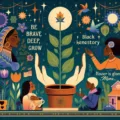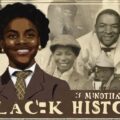Running has a unique way of setting our spirits free. Each footfall connects us back to the essential rhythm of life. With wind on our faces and strength in our lungs, we rediscover the joy of movement.
For Black runners, each stride also carries deeper meaning. The freedom we feel has been hard-won through history. Running connects us to ancestors for whom movement meant survival. It grounds us in a lineage of resilience.
The Long Road to Freedom
From slave catchers to Jim Crow to modern injustice, Black bodies in motion have faced resistance. Running has not always been the act of joy and self-care it can be today. We honor those who paved the way for us to move freely.
Movement as Power
Reclaiming the right to run brings confidence and empowerment. As we connect with the strength in our bodies, we also connect with an enduring inner power passed down to us. Each step makes a statement of capability, hope and joyful self-expression.
Community Ties
Sharing the road and trail with other Black runners builds bonds through common experience. We understand the layered meaning in each other’s strides. Race day cheers carry shared history and pride. We run with purpose, remembering those who came before.
Passing the Baton
As we pass fellow Black runners, we pass more than each other on the course. We pass forward the torch of possibility to the next generation. Children see themselves reflected in us as we reflect those who inspired our steps. May our footfalls clear the path for those to come.
Lifting as We Climb
With arms swinging and hearts open, every stride is also a stretch upward. We carry dreams of positive change in our soles. As we raise ourselves, we raise our communities. We run with purpose, eyes on the horizon of justice.
Frequently Asked Questions
Is running truly free for Black people today?
While legal barriers to movement have lessened, systemic racism still impacts Black runners. Continued advocacy is needed to secure equitable access to safe public spaces for training and events.
How can I support Black runners in my community?
Amplify Black running groups on social media, shop at Black-owned running stores, cheer loudly for Black runners at races. Also contact local government about improving infrastructure and safety in underserved neighborhoods.
What unique challenges do Black women runners face?
Black women overcome intersectional bias based on both race and gender. They may face increased safety concerns running alone. Community support and self-care practices help Black women runners thrive with resilience.
How can I honor the history of Black runners?
Learn about groundbreaking Black runners like Major Taylor. Read books like “A Most Beautiful Thing” about the first Black high school rowing team. Engage with media elevating underrepresented stories. Walk or run events that support Black youth.
Why is representation important in running?
Seeing people like us reflected in running media and leadership builds belief that we belong in the sport. Visible role models inspire Black youth to imagine their own athletic dreams. Representation fuels participation at all levels.









